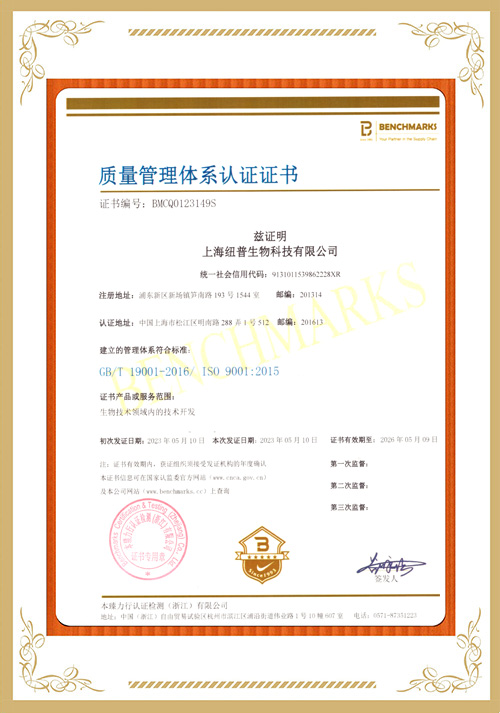- 抗体类型:单克隆
- 抗体来源:兔
- 抗体应用:IHC-P
- 特异性:Mouse CNDP2
Has cross-reactivity in ELISA with Human CNDP2
产品详情
-
产品名称
Anti-CNDP2 antibody
-
抗体类型
单克隆
-
抗体来源
兔
-
抗体亚型
兔IgG
-
抗体描述
Rabbit monoclonal to CNDP2
-
抗体应用
IHC-P
-
应用推荐
IHC-P: 1-10 μg/mL
-
特异性
Mouse CNDP2
Has cross-reactivity in ELISA with Human CNDP2 -
蛋白别名
0610010E05Rik, C76600, Cn2, CN2, Cndp2, CNDP2, CPGL, Dip-2, FLJ10830, HsT2298, Pep1, Pep-1, PEPA, CN2, CPGL, PEPA, HsT2298, HEL-S-13, Cn2, Pep1, Dip-2, Pep-1, C76600, 0610010E05Rik
-
制备方法
This antibody was obtained from a rabbit immunized with purified, recombinant Mouse CNDP2 (rM CNDP2; NP_075638.2; Met1-Asn475).
-
组分
0.2 μm filtered solution in PBS with 5% trehalose
-
储存方法
This antibody can be stored at 2℃-8℃ for one month without detectable loss of activity. Antibody products are stable for twelve months from date of receipt when stored at -20℃ to -80℃. Preservative-Free.
Sodium azide is recommended to avoid contamination (final concentration 0.05%-0.1%). It is toxic to cells and should be disposed of properly. Avoid repeated freeze-thaw cycles. -
背景介绍
Mouse cytosolic non-specific dipeptidase, also known as CNDP dipeptidase 2, Glutamate carboxypeptidase-like protein 1, Peptidase A, CNDP2 and CN2, is a cytoplasm protein which belongs to the peptidase M20A family. CNDP2 / CPGL is a cytosolic enzyme that can hydrolyze carnosine to yield l-histidine and beta-alanine. CNDP2 / CPGL hydrolyzes a variety of dipeptides including L-carnosine but has a strong preference for Cys-Gly. It may be play a role as tumor suppressor in hepatocellular carcinoma (HCC) cells. Isoform 1 of CNDP2 / CPGL is ubiquitously expressed with higher levels in kidney and liver (at protein level). Isoform 2 of CNDP2 / CPGL is expressed in fetal tissues, it is only expressed in adult liver and placental tissues. CNDP2 / CPGL is highly expressed in the histaminergic neurons in the tuberomammillary nucleus, implying that it may supply histidine to histaminergic neurons for histamine synthesis.
-
参考文献
- Bakker,SJ. et al., 2008, Diabetes 57 (12):e16; author reply e17.
- Wanic, K. et al., 2008, Diabetes 57 (9): 2547-51.
- McDonough,CW. et al., 2009, Hum Genet 126 (2): 265-75.
- Kaur,H. et al., 2009, J Biol Chem. 284 (21):14493-502.


